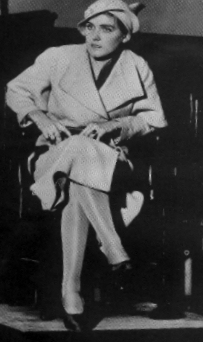
Ruby Bates was, like Victoria Price, a poor Huntsville millworker who became one of the two accusers of the Scottsboro Boys. But, unlike Price, Bates later recanted her story of rape aboard a Chattanooga to Memphis freight train, and went on to actively campaign for the release of the jailed black defendants.
Bates had a tough childhood. Her mother was a prostitute. Her father was a shiftless drunk who would beat her, her mother, and her siblings. When her father was jailed for horse-whipping her brother, the family left and began to move from one northern Alabama town to another before settling in Huntsville, where, at age fifteen, Ruby took a job in the Margaret cotton mill. Bates lived with her family in an unpainted wooden shack in worst part of Huntsville. Her family was the only white family on the block. Contrary to popular belief, segregation did not reach to the lower rungs of southern society, and Ruby lived, played, and slept with blacks.
Bates was frequently described as a "notorious prostitute." A defense affidavit of a resident of Chattanooga, where Bates rented a room for a time in a boarding house, stated that Bates often had "negro men in her room all night," and would sleep with as many as three men in an afternoon.
As a prosecution witness in the first trials in Scottsboro, Bates proved to be much less effective that the brasher and more confidant Price. Shy, inarticulate, and insecure, Bates was a poor liar. Moreover, she could not identify any of her attackers and failed to corroborate Price on key points of her testimony.
Less than nine months after the first trial, Bates wrote her then boyfriend, Earl Streetman, a letter in which she denied having been raped: "those Negroes did not touch me....i hope you will believe me the law dont....i wish those Negroes are not Burnt on account of me." At the end of 1932, Bates left Huntsville for Montgomery, then Chattanooga, then New York City, where she landed a job in a tourist camp on the outskirts of the city. The Scottsboro case was in the papers, and Bates decided to visit a prominent minister named Harry Emerson Fosdick and confess her lies. Fosdick encouraged her to return to Alabama and tell the truth.
Bates was a surprise witness for the defense in the second Haywood Patterson trial. She recanted her story of the rape, saying she was encouraged by Price to make the false accusation as a way of deflecting attention from possible charges of vagrancy or Mann Act (crossing state lines for immoral purposes) that they otherwise may have faced when they were among those rounded up by the posse in Paint Rock. Thomas Knight was merciless on cross-examination. He shouted at her, pointed out every minor inconsistency in her story, and suggested she had been bought by the communists. In his summation, Knight said that Bates "sold out for a gray coat and a gray hat." Bates's performance at the trial made her an object of intense southern scorn, and she had to be whisked into hiding by heavily armed deputies.
After the trial, Bates headed northeast and joined the International Labor Defense campaign for release of the Scottsboro Boys. Her speeches mixed communist rhetoric and apologies. She said "she was sorry for all the trouble that I caused them," and said she did so because she was "frightened by the ruling class of Scottsboro." She appeared in rallies, parades, and went to Washington where she met with the Speaker of the House and Vice President John Garner.
In 1940, Bates moved to Washington state, where she married. She returned to Alabama in the 1960's. She died on October 27, 1976 at age sixty-three.
